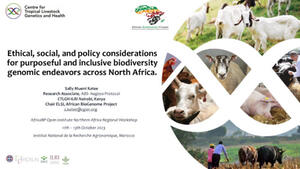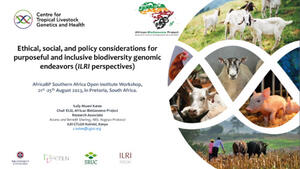
Evolution of fungal and non-fungal eukaryotic communities in response to thermophilic co-composting of various nitrogen-rich green feedstocks
Abstract
Thermophilic composting is a promising soil and waste management approach involving diverse micro and macro-organisms, including eukaryotes. Due to sub-optimal amounts of nutrients in manure, supplemental feedstock materials such as Lantana camara, and Tithonia diversifolia twigs are used in composting. These materials have, however, been reported to have antimicrobial activity in in-vitro experiments. Furthermore, the phytochemical analysis has shown differences in their complexities, thus possibly requiring various periods to break down. Therefore, it is necessary to understand these materials’ influence on the biological and physical-chemical stability of compost. Most compost microbiome studies have been bacterial-centric, leaving out eukaryotes despite their critical role in the environment. Here, the influence of different green feedstock on the fungal and non-fungal eukaryotic community structure in a thermophilic compost environment was examined. Total community fungal and non-fungal eukaryotic DNA was recovered from triplicate compost samples of four experimental regimes. Sequencing for fungal ITS and non-fungal eukaryotes; 18S rDNA was done under the Illumina Miseq platform, and bioinformatics analysis was done using Divisive Amplicon Denoising Algorithm version 2 workflow in R version 4.1. Samples of mixed compost and composting day 84 recorded significantly (P<0.05) higher overall fungal populations, while Lantana-based compost and composting day 84 revealed the highest fungal community diversity. Non-fungal eukaryotic richness was significantly (P< 0.05) more abundant in Tithonia-based compost and composting day 21. The most diverse non-fungal eukaryotic biome was in the Tithonia-based compost and composting day 84. Sordariomycetes and Holozoa were the most contributors to the fungal and non-fungal community interactions in the compost environment, respectively. The findings of this study unravel the inherent influence of diverse composting materials and days on the eukaryotic community structure and compost’s biological and chemical stability.
Citation
Matheri, F., Kambura, A.K., Mwangi, M., Karanja, E., Adamtey, N., Wanjau, K., Mwangi, E., Tanga, C.M., Bautze, D. and Runo, S. 2023. Evolution of fungal and non-fungal eukaryotic communities in response to thermophilic co-composting of various nitrogen-rich green feedstocks. PLOS ONE 18(5): e0286320.










